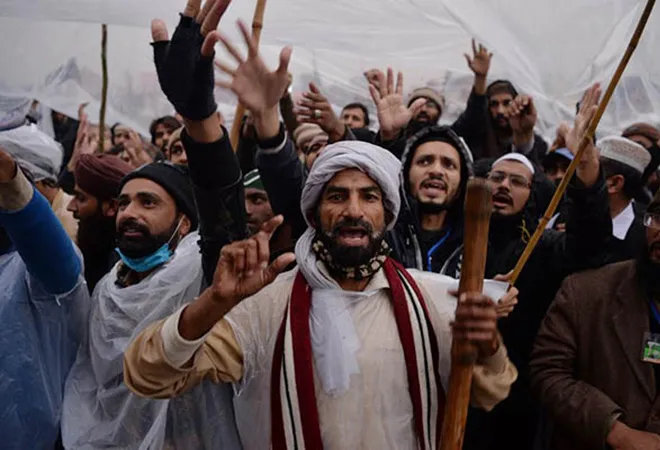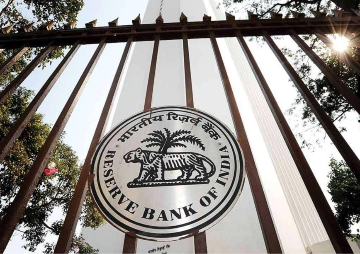
Last week in Islamabad, the government agreed to a deal with violent Islamist protestors, who had brought the country to a standstill for three days. The protestors were members of hardline Tehreek-e-Labbaik Pakistan or TLP, who were against the acquittal of Asia Bibi, a Christian woman accused of blasphemy in 2010. Her crime was that she took a sip of water from a well that was not meant for her and then she allegedly insulted Prophet Mohammad. In the deal stuck by the government, the protestors were assured that Asia Bibi would not be allowed to leave the country and that the government would not oppose a review petition filed against the Supreme Court’s judgment. The protestors accepted and the government put Asia Bibi’s life in mortal danger. The events of last few weeks in Pakistan are a sordid reminder of how the state has steadily embraced radical Islamists. In order to understand the current protests and their implication for Pakistan, it is necessary to put them in historical context.
The blasphemy laws in Pakistan are a colonial-inheritance, much like other criminal, penal laws and judicial structures in the country.
During Zia-ul-Haq military dictatorship in the 1980s, a number of clauses were added that expanded the law over the decades. In 1986, the government passed a law to include the death penalty as punishment, with a claim made that there was an absolute ijma or consensus in Islamic legal tradition about the death penalty for anyone (Muslim or non-Muslim) who insulted Prophet Mohammad. In 1991, the Federal Shariat Court recognized blasphemy as a hadd offence, where a single and simple transgression of Prophet Mohammad was punishable by death with no possibility of pardon or mitigation of sentence. Since 1990, 62 people have been murdered on unproved blasphemy allegations.
Over the years there are many who have spoken out against the draconian nature of the law. A private bill was proposed by the PPP in 2010 to amend the law, to simply include a proper procedure of offence and reporting of cases to a higher-level police official. The bill never made it to the floor, withdrawn by the government after pressure from religious groups. Yosaf Raza Gilani, the prime minister at that time, went so far as to invite religious leaders, after his government had ruled out reforms, to “come and tell us how to prevent misuse” of the law. In 2011, Shahbaz Bhatti, a minority minister and Salman Taseer, the governor of Punjab, were killed after they spoke out for amendment of the law. Taseer was killed by Mumtaz Qadri, a follower of the Barelvi sect of Sunni Islam and the governor’s personal security guard. Qadri’s arrest and subsequent trial saw an outpouring of support for admiration for the killer by a number of hardline Islamist groups. He was exalted as a hero, when he claimed it was his religious duty to kill the minister who wanted to change the blasphemy law. When Qadri was hung in 2016, his supporters took the streets across Pakistan. They proclaimed him a martyr, chanted anti-government slogans and clashed with the police. Some reports say that the government was particular to choose the date for the execution as 29 February, a date that would come once every four years, thereby denying those who would commemorate his death anniversary annually.
It was amongst Qadri’s supporters, who had demanded his release, that TLP emerged. Led by their hothead cleric, Khadim Rizvi, the group mobilised quickly, based on Qadri’s rhetoric.
Since then they have created controversy at any time suggestions are made to amend or discuss the country’s blasphemy laws, using the opportunity to expand their outreach and garner publicity and support as the “defenders of Islam”. In 2017, the group laid siege to the capital, demanding the law minister to step down on charges of “blasphemy”. His crime was his alleged suggestion to change the wording on the oath document used by law ministers at their swearing-in, to recognize Prophet Mohammed as God’s final prophet, a move that the TLP saw as appeasing the Ahmadis, a persecuted religious minority. The TLP blocked the main highway connecting Islamabad to Rawalpindi for three weeks. After violent clashes with the police, failed to break up the protestors, the military stepped in with General Qamar Bajwa encouraging the former Prime Minister Shahid Abbasi to engage the Islamists in political dialogue. The PML-N government gave in to the group’s demands and the law minister stepped down.
When the Supreme Court of Pakistan acquitted Asia Bibi, a situation similar to last year was repeated. The TLP took to the streets calling for protests across the country. A TLP patron, Pir Abdul Qadri, called for the killing of the Supreme Court justices who ruled on the case. Pakistan Prime Minister Imran Khan rebuked the protestors for exploiting religious sentiments for political gain, and promised that the state would protect the lives of the people at all costs. However, the next day, the government announced that it was in talks with the religious groups who protested the decision. And, Asia Bibi was put on the exit control list, barring her from leaving the country and released all arrested TLP members.
The jarring ridiculousness with which Pakistan continues its penchant of using religion for state purposes is difficult to fathom. However, there always seems to be a way that the country outdoes its own self.
Subsequent governments have continued to surrender state sovereignty to far-right groups in some form or the other, continuing the state appropriation of Islam. It seems to believe that without religion playing a defining role in maintaining internal security and its external borders, Pakistan as a state would not have a reason to exist. The military-intelligence establishment’s pathological obsession with legitimising groups that provide their own warped-version of Islam, has made the foundation of Pakistani society unstable and unpredictable.
Pakistan’s support for the jihad against the Soviet Union’s rule in Afghanistan in the 1980s and its funding of Deobandi militant groups was the beginning of the state’s appropriation of Islam to achieve its goals. Deobandi Islam, as compared to Barelvi Islam, is seen as harder Islam, adhering to strict Islamic rituals. Barelvis on the other hand were seen as more moderate, following Sufi mysticism and emphasising a spiritual connection to God. Pakistan’s intelligence military establishment, encouraged by Saudi money for Deobandi madrassas, never worked with Barelvi groups for the Afghan and Kashmir jihad. It instead relied on groups such as the Tehreek-e-Taliban Pakistan, Lashkar-e-Taiba and Lashkar-e-Janghvi, and Deobandi Islam became associated with militant jihad and extremism. After 9/11 when Pakistan fell back into the US embrace, it dumped some Deobandi groups while it continued their flirtation with others.
Barelvi groups have, however, remained in the periphery of the state’s interests. The idea that Barelvi groups were the ‘soft version of Islam’ was because they have always traditionally been seen only in opposition to the Deobandis. The Barelvis, who were ignored by the state, have waited to reclaim their political space ever since. Now, it is making its voice heard. While the TLP is not the first political party to mobilise the Barelvi vote in the country, its rigid, inflexible and singular-point agenda of defending the country’s blasphemy laws has made it the most significant and dangerous in Pakistan’s short history. Its ability to bring the state to its knees and then have it do its bidding is explicit in Islamabad’s repeated behaviour of appeasing militants.
The TLP, however, needs to be understood and studied in its own right. It does not fall into the same category as the TTP, the Taliban or other non-Shiite groups, nor can it only be differentiated on the grounds of it being only Barelvi group.
It is unique as, until now, the TLP leadership has not picked up the gun, but have chosen electoral politics instead. In the general elections held earlier in July this year, the TLP contested their first national election, winning two assembly seats in Sindh and 2.5 million national assembly votes. Four out of every votes polled by the party came from Punjab, where it received more votes that the PPP. In the Punjab Assembly, it received the third largest share of votes, failing to translate the popularity into seats.
The government’s deal with the TLP is dishonorable and short-sighted as it vindicates the TLP’s stance that the blasphemy laws are sacrosanct. It validates Rizvi’s legitimacy as a political player and gives TLP the public confidence necessary to make demands of the state again in the future. While the Pakistani Taliban fought in ‘defense of Islam’ as a militant jihadist group, the TLP is an anarchist group, that use the government against its own institutions of government. It allows one person to become the savior of Islam and kill if the Prophet has been insulted, without allowing the state to arrest, try and prosecute an accused in a fair and unbiased manner.
The TLP’s hardline support for the blasphemy laws and advocating for the killing of anyone who disagrees with them, has proved how deep the radical Islam underbelly of Pakistan is. Ignored by the state and forgotten by the military, groups such as the TLP have radicalised Barelvi Islam. No longer will it be seen as a tolerant form of Islam in the country, compared to the Deobandi and Wahhabi radical fundamentalists. A shrine built for Mumtaz Qadri on the outskirts of the capital is visited by thousands every year, seeking the killer’s blessings. The government or the military has never contested this.
Perhaps the government is content and complacent with its decision to squash the protests, make a deal and keep Asia Bibi in the country in a clear risk to her life, simply to ensure international allies do not question its stability. The government is hoping to renew the country’s image in the eyes of the international community and attract foreign loans and aid to revive its failing economy. International media houses were quick to pick up on Asia Bibi’s acquittal to praise this “progressive” move, which is what the government needed. It did not follow up news stories on what the acquittal led to -- violent protests.
Unfortunately, what the country time and time again fail to see are the gaping holes in their national security strategy. Appeasement to avoid bloodshed never works.
The nuclear-weapon state will find no easy tools in its arsenal to deal with homegrown terrorists. Radicalising some elements of a society to use against others does not create a force that is loyal to the state. It only creates a militant-infested society where radicalisation and extremism are deeply entrenched. Societal faultlines and growing fundamentalist views are often not as visible as they seem, taking years sometimes decades to rear their ugly head. The TLP, the radical face of Barelvi Islam, is an example of that.
As the group’s strength increases in numbers and audacity, their ability to paralyse government, rattle society and strike fear and terror into those who disagree with their version of Islam is another new disease in the Pakistani body already ridden with sickness and ill health.
The views expressed above belong to the author(s). ORF research and analyses now available on Telegram! Click here to access our curated content — blogs, longforms and interviews.




 PREV
PREV


